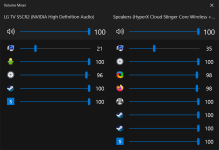Hi,
As I prepare to switch my desktop to "single gpu passthrough" style hypervisor multi-desktop
I'm curious, how can I handle sound in a coherent and organized manner ?
With just one guest OS the sound system already gets quite hectic

But how do you handle sound and microphones to multiple VMs ?
Do you have one VM that does all the sound things in one,
interfacing between physical sound devices and virtual sounds from the VMs ?
In my setup, I have
VMs that are enabled one at a time (proxmox)
I have VM that just play music
and in all of this I have a voice chat with my friend that I don't want interrupted just because I
switched my GPU VM from windows to linux
Does something like "sound vGPU" exist ? can multiple VMs share one sound card ?
Will I need to add half a dozen of those 5$ usb sound cards and a analog hardware volume mixer ?
Or can this be done digitally without compromising sound, reliability and especially latency ?
I do feel this is the cutting edge of "hypervisor desktop", I don't know if that's a thing of if I'm just making it up
but it's pretty exciting regardless
As I prepare to switch my desktop to "single gpu passthrough" style hypervisor multi-desktop
I'm curious, how can I handle sound in a coherent and organized manner ?
With just one guest OS the sound system already gets quite hectic

But how do you handle sound and microphones to multiple VMs ?
Do you have one VM that does all the sound things in one,
interfacing between physical sound devices and virtual sounds from the VMs ?
In my setup, I have
VMs that are enabled one at a time (proxmox)
I have VM that just play music
and in all of this I have a voice chat with my friend that I don't want interrupted just because I
switched my GPU VM from windows to linux
Does something like "sound vGPU" exist ? can multiple VMs share one sound card ?
Will I need to add half a dozen of those 5$ usb sound cards and a analog hardware volume mixer ?
Or can this be done digitally without compromising sound, reliability and especially latency ?
I do feel this is the cutting edge of "hypervisor desktop", I don't know if that's a thing of if I'm just making it up
but it's pretty exciting regardless

